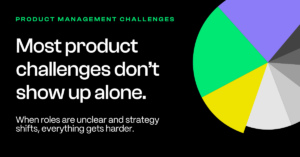
How IATA Created a Shared Product Language to Power Its Next Era of Innovation
Want a PDF version of this case study? Download Here Company Snapshot The International

In our “Behind the Product” series, we discuss examples of products or services that highlight a particular Product Management concept or principle. As Product Managers, we’re constantly watching new and old products, and the marketing associated with them, to find examples for our training and materials that we can use to exemplify good, or not so good, practices in Product Management.
When you hear the name Kellogg’s, chances are you think of breakfast cereal. But in recent years, Kellogg’s has become predominantly a snack-oriented business. It surprised me to learn that snack items — including cereal packaged for snacking — comprise over 55% of Kellogg’s products. Kellogg’s has further diversified its offerings to include frozen foods, noodles, and cookies — and they’ve recently added something a bit trendy to their repertoire: plant-based meat alternatives.
That’s right! Move over Impossible Burger and make way for Kellogg’s Leaf Jerky and Incogmeato. According to Chief Growth Officer (CGO) Monica McGurk, who was recently interviewed by McKinsey & Company’s Jordan Bar Am, these and other products are part of the ongoing diversification that enabled four consecutive quarters of growth from organic sales.
McGurk credits Kellogg’s internal incubator and start-up competitions — along with focusing venture capital funds on high-achieving companies — for helping the company introduce products to market faster.
For instance, during Kellogg’s annual start-up competition “Tiger Tank” (similar in concept to the TV show “Shark Tank”), one of Kellogg’s Brand Managers pitched the idea for Leaf Jerky. She was inspired to create a plant-based, meat alternative snack that even her husband, who prefers real meat, would love. No matter what you think about meatless jerky, her pitch won over the judges, and she received funding and support from Kellogg’s to bring her concept to market.
Kellogg’s ideas don’t always come from personal experiences, though. In listening to the interview with McGurk, it became clear to me that the brand managers at Kellogg’s conduct a lot of market research, and lean on Agile methodologies and best practices to iterate and innovate effectively.
What kind of Agile methodologies? The ones that help Product and Brand Managers introduce new products to market faster. By testing and learning rapidly, they build products that their customers love — and they continue to iterate to trump the competition.
According to McGurk, her team’s ability to work with flexible go-to-market strategies helps them accommodate changing market conditions and consumer preferences, and introduce successful meat-free products quickly that fly off the shelves, while other meatless products sit there collecting dust.
Kellogg’s provides a shining example of applying Agile development techniques outside the software industry, where it got its start. Agile practices enable companies to respond to change, mitigate risk, and manage uncertainty by iterating continuously throughout and following product introductions until they get it right. As part of this methodology, Kellogg’s develops prototypes quickly in collaboration with customers and tests them early and often. Additionally, focusing on collaboration — both internally and with the target buyer — has proven to be an effective approach to accelerating time to market at Kellogg’s.
And it doesn’t stop after new products are lining the supermarket shelves; Kellogg’s keeps updating and iterating on existing products as consumers’ needs and preferences change over time. In other words, Agile product development is a never-ending process — one that requires considerable research and collaboration.
Like most people, I’ve learned that past failures provide insights for future endeavors. And Kellogg’s leverages such insights to turn product failures into future wins. In fact, they use what they learn when products fail to revise and improve testing, and develop better products based on consumer input — an approach enabled by Agile development practices.
McGurk warns against this process becoming “reckless.” Data analytics are central to a successful Agile development process.
Case in point: Joybol, a pre-packaged smoothie-like drink that failed miserably upon its first market introduction. Instead of scrapping the whole project and starting from scratch, Kellogg’s used customers’ negative feedback to quickly make changes and refine the product. They re-introduced it and it’s now performing well. And it happened quickly — in under six months. That’s the power of leveraging data analytics to fuel Agile development.
To that end, McGurk says that Kellogg’s is monitoring not only consumption metrics for Incogmeato, but customer feedback around how the product looks, smells, and sizzles, too. All of this data will be leveraged in future product iterations to make Incogmeato tastier and even more profitable for Kellogg’s.
It seems pretty obvious but edging out the competition has bolstered Kellogg’s success with the new meatless products. And the supply chain had a lot to do with it. Severe supply chain disruptions over the past year and a half have been the death of smaller, newer retailers in the plant-based meat alternative sector, mostly due to a lack of experience in navigating supply chain complexities.
Say you have the best meatless product out there and you anticipate high demand as soon as it hits the shelves. But your deliveries are late, or the cases and packaging are damaged. An inability to manage supply can make all your product development efforts worthless, so it’s critical to get it right.
For Kellogg’s, managing demand at scale was something they’d already perfected over the years, and this provided an additional competitive advantage when Leaf Jerky and Incogmeato landed at the nation’s grocery stores.
Today, Leaf Jerky and Incogmeato are giving Kellogg’s a leg or two up in the competition against smaller players in the plant-based meat alternative market. But if not for Kellogg’s data-driven, Agile development approach, these products could have languished in the testing phase, missing the opportunity to capitalize on the growing popularity of plant-based meat alternatives. Thanks to quick iterations and rapid market introductions, these products are top-shelf.
As Kellogg’s has proven, you can breathe new life into existing product offerings once thought lifeless if you take time to analyze the data, iterate, and collaborate — and put the lessons learned from product introduction mishaps to work to pivot, innovate, and wow the market with something new. However, achieving this requires a solid grounding in Agile product development principles and strategies, and training on how to leverage data analytics to drive product interactions and innovation. Productside can get you up to speed with access to essential Product Management training courses.
Sign up for our Agile Product Management course to learn how to harness Agile methodologies from a Product Management perspective, and build products that matter – faster and more effectively.


Want a PDF version of this case study? Download Here Company Snapshot The International

Most product teams don’t fail because they can’t ship. They fail because product discovery didn’t do its job. As product managers and product leaders, we’ve all lived this

Product management feels harder than it should It’s not because teams are lazy. Not because PMs